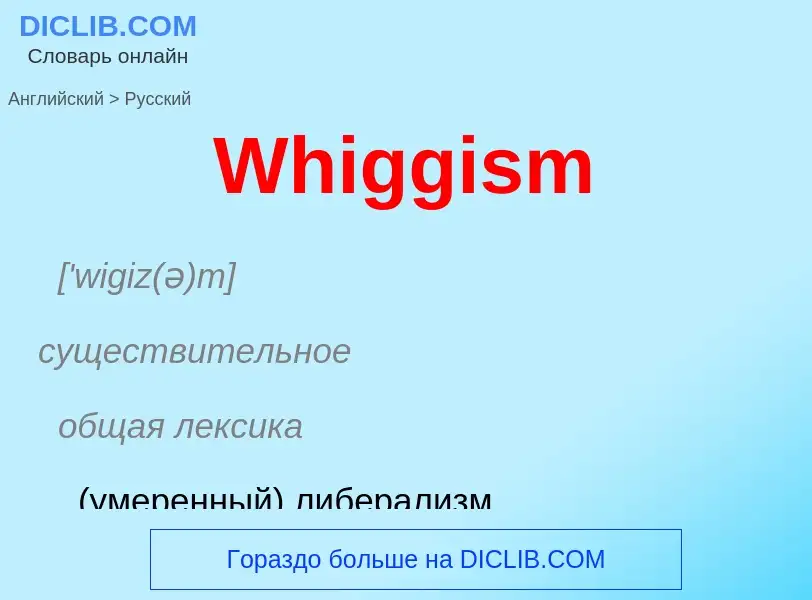Μετάφραση και ανάλυση λέξεων από την τεχνητή νοημοσύνη ChatGPT
Σε αυτήν τη σελίδα μπορείτε να λάβετε μια λεπτομερή ανάλυση μιας λέξης ή μιας φράσης, η οποία δημιουργήθηκε χρησιμοποιώντας το ChatGPT, την καλύτερη τεχνολογία τεχνητής νοημοσύνης μέχρι σήμερα:
- πώς χρησιμοποιείται η λέξη
- συχνότητα χρήσης
- χρησιμοποιείται πιο συχνά στον προφορικό ή γραπτό λόγο
- επιλογές μετάφρασης λέξεων
- παραδείγματα χρήσης (πολλές φράσεις με μετάφραση)
- ετυμολογία
Whiggism - translation to ρωσικά
['wigiz(ə)m]
существительное
общая лексика
(умеренный) либерализм
история
теория и практика вигов
принадлежность к вигам
к партии вигов
Βικιπαίδεια
.jpg?width=120)
Whiggism (in North America sometimes spelled Whigism) is a political philosophy that grew out of the Parliamentarian faction in the Wars of the Three Kingdoms (1639–1651). The Whigs' key policy positions were the supremacy of Parliament (as opposed to that of the king), tolerance of Protestant dissenters, and opposition to a "Papist" (Roman Catholic) on the throne, especially James II or one of his descendants. It is associated with early conservative liberalism.
After the huge success (from the Whig point of view) of the Glorious Revolution of 1688–1689, Whiggism dominated English and British politics until about 1760, although in practice the Whig political group splintered into different factions. After 1760, the Whigs lost power – apart from sharing it in some short-lived coalition governments – but Whiggism fashioned itself into a generalised belief system that emphasised innovation and liberty and was strongly held by about half of the leading families in England and Scotland, as well as most merchants, dissenters, and the middle classes. The opposing Tory position was held by the other great families, the Church of England, most of the landed gentry and officers of the army and the navy. Whigs also opposed Jacobitism, a movement of traditionalists tolerant of Roman Catholicism, with substantial Tory overlaps. While in power, Whigs frequently referred to all opponents as "Jacobites" or dupes of Jacobites.
Whiggism originally referred to the Whigs of the British Isles, but the name of "Old Whigs" was largely adopted by the American Patriots in the Thirteen Colonies. Following independence, American Whiggism became known as republicanism. The term "Old Whigs" was also used in Great Britain for those Whigs who opposed Robert Walpole as part of the Country Party.
Another meaning of whiggism given by the Oxford English Dictionary is "moderate or antiquated Liberalism".

.jpg?width=200)

